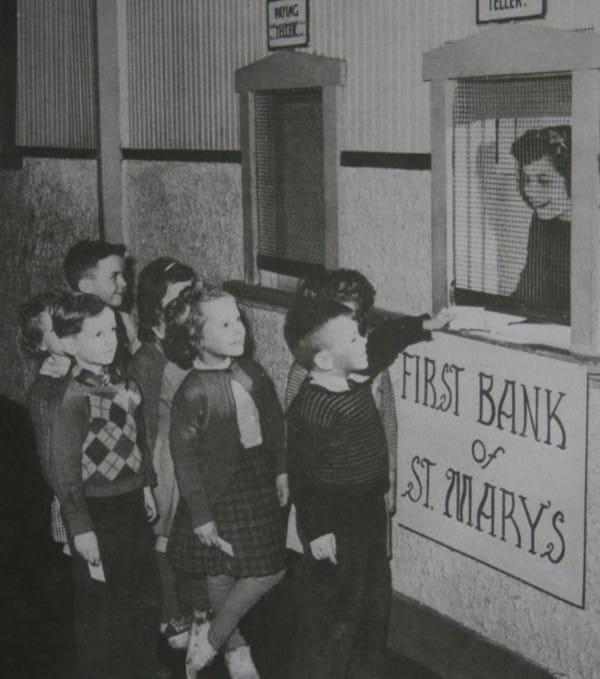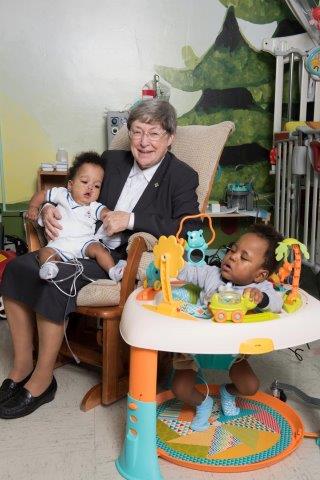Our History
The Road to 140
Maryville Academy celebrated the 140th anniversary of its official dedication on July 1, 2023. The milestone celebration highlights its mission of protecting children and strengthening families from its humble beginnings as Saint Mary’s Training School in 1883.
Archbishop Patrick A. Feehan established the orphanage in the 880-acre Knott Farm located north of Des Plaines. This was a place for dependent and neglected boys to live, learn a trade and obtain their education. In 1911, Saint Mary’s population increased with the coming of the girls from three Chicago all-girl institutions.
As the population on campus grew, so did the need for new programs. Msgr. Eugene Mulcahey started a four-year high school program in 1939. A name change happened in 1950 when the school children selected Maryville Academy as its new name. Construction on the new residence for high school boys was completed in 1961 while high school girls occupied two new residential homes for the first time in 1972. The Paulina House, the first foster care program and the only shelter for homeless and runaway children, opened in 1984. It served children with developmental delays and received the Child Safety Partnership Award from President Ronald Regan.
The Parenting Teen Center for pregnant teenage mothers also opened in 1984. To this day, Maryville still offers a home for teen mothers and provides them with the resources to grow and become a supportive and attentive parent. This program was initially based in Chicago but moved to the Eisenberg campus in Bartlett in 1991. A second location opened in Berwyn in 2022.
In 2005, a catastrophe struck New Orleans and its surrounding areas. Hurricane Katrina became an extremely powerful hurricane that caused enormous destruction and significant loss of life. It is the costliest hurricane to ever hit the United States. Maryville opened its doors and hosted families displaced by the hurricane. A year later, the Crisis Nursey opened for situations like this. The Maryville Crisis Nursery is a safe and nurturing short-term shelter for families with children, ages birth to 6, dealing with medical emergencies, family tragedies, homelessness, domestic violence, substance abuse, parental stress and other crises that can lead to child trauma and neglect.
Maryville has always made its mission to meet the ever-changing needs of children. Its priority since 1883 has always been protecting children and strengthening families through all the challenges of epidemics, pandemics, recessions, just to name a few.
Today Maryville is home to 19 programs in four service areas: family, residential, healthcare and educational in Bartlett, Berwyn, Chicago, Des Plaines and Niles. It is currently undergoing unprecedented programming growth to reach more vulnerable children and families. In November 2023, Maryville Jen School moved to its new home in Niles as Charles H. Walsh Sr. Academy and Career Tech High School. The expanded school will prepare diverse students to enter high-demand trades and be college-ready for a successful future.
Maryville’s leadership council, staff and supporters look back to the “Road to 140” with deep gratitude and pride, collectively recognizing the thousands of lives that have been transformed, and with special affection, thanking the Des Plaines community for 140 years of support. Looking ahead, Maryville is steadfast and resolute to reach thousands more children in the next 140 years.
St. Mary’s Training School
Times changed, world wars engulfed the globe, economic depressions came and went and the wards of the state increased in number. While the military, financial and political upheavals impacted all Americans, none were hit harder than the country’s poor and especially the children.
St. Mary’s was an orphanage, a chance at a decent life; an educator; a family – it was home to thousands of boys and girls. And had it not been for St. Mary’s, who can say what fate would have happened to the children? Eventually, St. Mary’s transitioned into what is now known as Maryville Academy.
Today, Maryville Academy meets the ever-changing needs of children and their families. From an orphanage to the teaching family model to today’s trauma-informed care model, Maryville Academy always makes the children its priority.


Sister Catherine M. Ryan, O.S.F., Maryville Executive Director
Directing that mission in recent years is Sr. Catherine M. Ryan, O.S.F. Sister Catherine was appointed executive director of Maryville Academy in December 2004. She was formerly the chief of the Juvenile Justice Bureau at the Cook County State’s Attorney’s Office. Prior to that, Sister Catherine was in private practice where she concentrated her practice in child welfare and family law.
To meet the escalating demand for services, Maryville has also established new programs, such as the Crisis Nursery and the Children’s Healthcare Center on the Northwest side of Chicago. The Maryville Crisis Nursery provides short-term care for children of families who are experiencing a crisis or are challenged with an urgent family matter. Children ages birth through six years old are provided with 24-hour emergency child care, up to 72 hours, in a safe and nurturing environment designed to protect them from harm. Families may utilize the Maryville Crisis Nursery up to 30 days in a rolling calendar year.
The Maryville Crisis Nursery provides families with immediate support, counseling and referrals to community resources for extended services. The quality services provided to both the children and families in need are free. The Nursery is one of six crisis nurseries located in Illinois, and is the only crisis nursery located in the Chicagoland area.
Sharing the same building as the Nursery, Maryville’s Children’s Healthcare Center is a long-term acute care and sub-acute care facility that provides specialized clinical care for medically fragile children, ages newborn through 21. The Children’s Healthcare Center is a “home away from home” for these children and their families.
The Children’s Healthcare Center provides care to children who may be technology-dependent (e.g., ventilators, apnea monitoring) and training for parents, caregivers, and siblings to help them become more confident when attending to the fragile child’s specialized needs. The Children’s Healthcare Center also offers respite care for caregivers, giving them much needed breaks from demanding schedules.
In 2007, Maryville started the Jen School on its Des Plaines campus. At Jen School, Maryville provides students, in grades 6 to 12 (ages 12-22), with integrated therapeutic and educational services. The school serves children in Maryville’s residential programs and students from the community with complex emotional, behavioral and learning disabilities. The Maryville Jen School staff uses hands-on, alternative and experiential teaching methods in conjunction with traditional instruction methods to maximize the student’s potential for success. Student-teacher ratios are as low as three to one.
Maryville’s St. Monica Home for mothers in recovery is a groundbreaking program for women of young children who are struggling with substance abuse. It is one of only a few programs where children can remain living with their mothers while the mothers receive treatment for substance abuse. The program is located in the Madden Center on Chicago’s Near West Side.
Maryville remains a home for children. Our Eisenberg Campus in Bartlett, Illinois is home to our Casa Salama and Casa Imani programs for girls. These programs provide a home and therapeutic care for girls and young women with intellectual disabilities and mental health issues, and pregnant and parenting young women. The St. Dominic Savio program on our Des Plaines campus provides residential care for young men who are transitioning from the juvenile justice system back to their home communities.
Maryville’s Family Behavioral Health Clinic continues to grow. There are now five locations in the city and the suburbs where individuals seeking mental health and substance abuse treatment can find help.
Throughout our history, the focus is to take care of children who need help. Once a simple orphanage and a family teaching model, Maryville continues to change and adapt. The emphasis today is on a “trauma-informed care” clinical model – to get to the roots of the trauma and understand and treat those problems. Maryville is proud to be accredited by the Council on Accreditation (COA).
